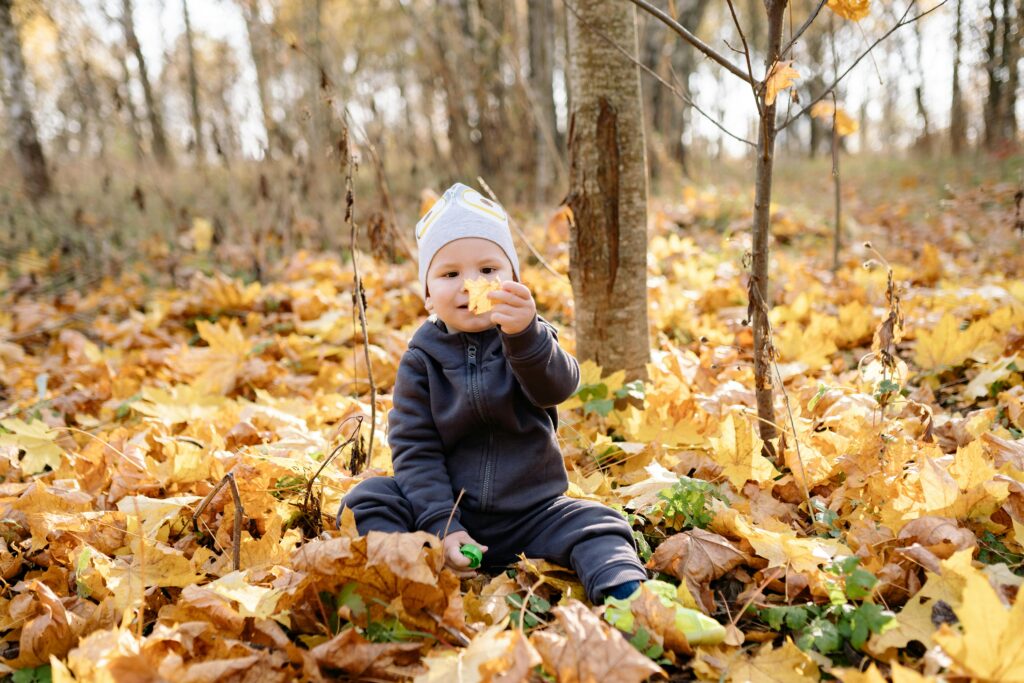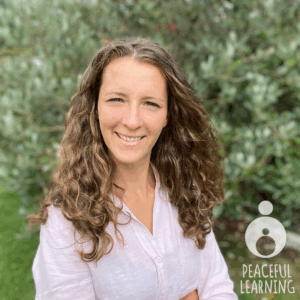
What is the RIE® (Resources for Infant Educarers) Method?

This week, we sat down with Lara Ritson, founder of Peaceful Learning and a teacher and nanny who uses the RIE® principles and Magda Gerber’s Educaring® Approach to learn more about the RIE (Resources for Infant Educarers) approach to caregiving, and how it can benefit children.
With a deep commitment to creating environments where children feel safe, valued, and empowered, Lara supports families and educators in building strong, respectful relationships that foster lifelong learning and emotional wellbeing. Her work through Peaceful Learning blends practical guidance with a philosophy rooted in connection, presence, and trust in each child’s natural development.
What is the RIE® method?
The RIE method is an approach to childcare based on mutual trust and respect with a focus on stepping back and having high quality, over quantity, interactions with a child. It focuses on becoming truly present with a child and slowing down and observing what is happening for them. Allowing space for all emotions to come up and lean into them rather than distract or change their state with entertainment.
What differentiates RIE from other parenting philosophies? What drew you to this method?
I would say the difference between this and other similar holistic approaches is the focus on caregiving as the point of connection and learning from adult-led interactions. It focuses on relationships over anything else as the most important and crucial part of a young child’s life and the time spent outside of caregiving moments as opportunities for the child to explore their world around them feeling confident and fulfilled. It is the adult’s role to observe what they are interested in during their time exploring and add resources to the environment that will build on that interest without the adult initiating the exploration of the new resources. They are just put into the child’s environment and it is up to them whether they choose to interact with it or not.
What are the main benefits for children of the RIE method?
Experiencing what it’s like to feel truly respected and trusted by an adult. This leads to higher levels of self worth and confidence in their abilities, trusting their own judgement in situations and developing a higher level of intrinsic motivation to learn and do. I recently attended a seminar at the annual RIE Conference with a panel of children who were raised with the RIE method ranging from 13 to around 26 and what kept coming up was that when someone else was treating them with a lack of respect they immediately thought that there was something going on for the other person rather than themselves and they noticed that friends who were raised differently thought there was something wrong with themselves and that they did something wrong. These children all came across as confident, competent people. They also said how they thought it was strange that their friends growing up, didn’t confide in their parents when they were teenagers and young adults as they didn’t feel safe or accepted. The whole panel felt that their parents were their safe place where they can lean in and be held with no judgements of who they are. So I would say that one of the main benefits is having a secure attachment to an adult in their lives which leads to many benefits.
What does “educaring” mean in RIE?
Educaring is about combining learning within caring moments like nappy changes, eating and bathing. There is so much that happens during these moments where conversations happen about the world around them, lessons in science, maths and language. This is why, when we care for a child using RIE, we slow right down to allow opportunities for interaction and cooperation, connection and learning.
What age group is RIE appropriate for?
I would say it’s aimed at 0-3 year olds and pairs quite nicely with Montessori 3-6. However, its principles can be applied to a child or adult of any age. In fact, I think RIE® could make a huge impact where any human is being cared for by others like aged care and hospice, hospitals and the like.
What are some RIE recommended family games or activities?
I would highly recommend taking 5-10 minutes out of your day when coming back together, especially if you are working and your child’s care is based elsewhere to just sit, with no agenda, with open body language, on their level and give them your full, undivided, unhurried attention. I would recommend sitting crossed legged if you can with your palms resting face up on your knees with an open face. Observe your child, see what they show you. You may be surprised at what you see. Your child will absolutely love this and it gives them the opportunity to get their love cup filled and your day may become easier because they’ve had this time and connection with you.
How can parents start applying RIE principles at home with a newborn?
I would say the first thing they can do is slow dowwwwn, really have a look at what is going on for your baby. The first relationship to you they are going to have is through your hands and voice so intentionally using these to communicate respect and love. Their cries are a form of communication, what are they wanting to communicate to you? What emotions are coming up for you when you hear your baby cry? Are their stories coming up from your past that are getting in the way of what is happening in front of you? Also, I feel that parents are hounded with products that have great marketing but little value to a young child. They have just come into the world so literally everything is absolutely fascinating, you don’t need light up toys or bright plastic things. My nephew is 3 months at the moment and just discovered his hands (!) and he gets absolutely excited by coloured cloths and socks, he can also spend 30-40 minutes at a time lying near the trees and watching them move. He has a peace lily that he loves which is his indoor plant that he lies under and his arms and legs get super excited by their giant leaves. I was also drinking my tea this morning and he just watched with fascination as I slowly drank. I placed the cup down next to him and he stared at it for a long while, taking it all in. This could happen because I slowed down to see what he was really interested in.
What advice do you have for a parent with a young child dealing with tantrums? How can they better communicate with their child during a meltdown?
I would say, first off, know your own limits. What can you handle without flipping your lid, what can you do to help yourself stay calm during a tantrum? For example, I cannot handle a high pitched scream so I make sure I get my earplugs so I am less likely to be triggered and can remain calm and centered. Next, I would have a conversation with myself about whether the tantrum that is ensuing is due to being tired, hungry, disconnected e.t.c and whatever just happened was not the core reason, for example, they got the red spoon and actually wanted the yellow one or if its regarding something bigger like their dad just left for work and they wanted to hang out with them for the day but they can’t. This is important to know to help yourself through the tantrum to remain calm. Narrating what you see, ‘I see that you are really tired as you weren’t able to have your full nap today and it’s just before dinner so you are probably very hungry too. You really wanted the yellow spoon but it’s unavailable. I am here for you if you need a cuddle.’ And sit on the floor near them with open body language allowing space for the tantrum to happen. If you are time poor in that moment, talking through what is happening and letting them know that you are there for them if they need while going about what you need to do e.g. carry on cooking dinner as its getting late and you know that is one of the reasons why your child is reacting so big. All emotions are valid and you as the adult are responsible for guiding them through the rollercoaster of emotions. They may be having a hard time but they still need to eat so explaining that you are going to pick them up now and sit them on your lap while offering food so help regulate their system will be helpful. We stay away from phrases like ‘You’re fine.’ ‘It’s just a spoon.’ ‘That’s enough now.’ We lean into ‘There’s a lot coming up for you right now.’ ‘I’m here if you need me.’ ‘Lets try some deep breathing.’
What are the biggest misconceptions about RIE?
I think one of the biggest misconceptions about RIE is around the word respect and holding a child in that space. What I’ve noticed is the mutual part of the word gets missed and so parents and caregivers aren’t holding boundaries for themselves and role modeling what respect for oneself looks like to a child and it quite often turns to passive parenting with this misconception. When working with a child using the RIE method, you narrate a lot of what you are doing with the child and ask the child’s permission to do things to them when you first start working with them or getting to know them however, I’ve noticed this continues to happen once a relationship is formed and those healthy boundaries and safe containers that children so very much crave are not present and it can create disregulation for all involved. An example is asking a child to change their nappy and they say no, now you are stuck with either respecting their wishes to not be changed and for them to then get a nappy rash or have a mess or spill out the nappy or to break your word which shows the child that asking for permission to do things with them doesn’t actually hold any value when you then take the child and change them anyway. Does that make sense?
So instead of asking for permission once a relationship has been formed, you can give them an option within the task that needs to be done like, you need a nappy change, would you like to walk to the change table or shall I carry you? And if they aren’t cooperating, to then state, I’m going to pick you up now and carry you to the nappy changing table. There may be feelings expressed at this point, they might not be happy about it, but it is going to happen. Narrating what you see is helpful. ‘I see that you are upset as you don’t want to have your nappy changed right now, we need to change it because it is full.’ If they continue to be upset, use observation to see why they do not want or like their nappy changed. Are they engrossed in an activity? What’s happening in the process that they don’t like? Perhaps the wipes are too cold or it’s too rushed, perhaps someone has shamed or teased them about having feces in their nappy, in a well meaning way but has not been received that way. What I have heard quite a bit is along the lines of ‘Eww, have you done a stinky? Oh wow, that’s a really smelly one, poo-ey!’ These may be well-meaning however it can have lasting effects on a child and I have seen children up to 5 years old still soiling nappies as they have a mental block around it due to the shaming or pressure of being toilet trained.
What was your journey into RIE, and how has it changed your perspective on child development?
Oh man, it has changed not only my perspective on child development but my life! Learning what true respect looks like and learning to hold that space for myself and others. Standing up for my own needs and wants while negotiating with another person. What real presence looks like and actively listening to someone through their words and body language. I have become extremely attuned to how a person may be feeling because of this. I stumbled into it through my grandma who is an Alexander Technique teacher which is about unlearning movement to come back to the natural way we are supposed to move which is closely linked to RIE, as RIE is all about children learning to move at their own pace without intervention. Watching the natural development of a child unfold is so beautiful to observe. I only learnt after studying RIE that a child’s ability to sit comes after learning to crawl whereas, a mainstream milestone is whether a child can sit first. It is being taught incorrectly! I think the biggest take-away from my time studying and practicing RIE is that children are born with everything they need and it is the adults role to tune into that and provide an environment that nurtures this. It has taken moments of caregiving that I used to tolerate, like nappy changes, and turned them into moments of joy, learning and connection with a child.
Are there any RIE practices that you’ve personally found challenging or surprising?
Yes, my first week of working in a RIE daycare centre, which was also my first introduction to the method in person. I wasn’t allowed to interact with the children, I was doing things in the background like the washing, helping with the food e.t.c but that was it. After a week or so, I was allowed to do observations in the room which entailed sitting in a corner and literally sitting on my hands (by my choice) as I wasn’t allowed to instigate or continue interactions that were created by the child. Just to acknowledge what they were presenting to me and then return to neutral. It was a painful experience to go through, literally my body ached and my brain was exhausted, as I was rewiring my brain but it was well worth the wait as I watched the most magical moments happen with the children that could have been interrupted if I wasn’t sitting in the corner keeping my mouth shut. I really understood the value of taking the adult-led interactions away and becoming as boring as possible so the child can really explore their world on their own terms and more often than not, they show me things that I had never thought of or was possible.
For those that want to learn more about RIE, do you know of any websites, books, or podcasts that are good resources?
Absolutely! Of course www.rie.org is a great place to get all information on anything RIE. All books, events and RIE Associates around the world are listed there if you want to get proper training or 1-1 coaching. I would say, stick to this site if you want to get the real authentic experience of RIE.
Contact us now to start the process of finding a nanny with specific RIE training and experience.
Related Blog Posts
Mindfulness Book Recommendations for Children
